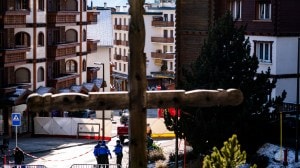Cargo on watch
...

A month later, US Customs and Border Protection Commissioner Robert C Bonner said the Rapiscan system was a 8216;8216;unique tool in our arsenal of detection technology to protect our country8230; achieving increased security against terrorist threats, and doing so without shutting down trade flow and damaging our economy.8217;8217;
By September, Rapiscan had parlayed the events into a 16-million sale of Multiple Eagle systems to a customer that the company declined to identify for security reasons. It was a moment of clarity in a crowded field where companies have a hard time differentiating themselves from rivals, much less furnishing proof that their products will thwart a terrorist attack.
8216;8216;Indian customs officials sent photos of the seizure to us and most engineers had them up on their desks for weeks,8217;8217; said Peter Kent, Rapiscan8217;s vice-president of government affairs. 8216;8216;For those who spent years of testing and failing, knowing it was being used and helping against terror was very motivating.8217;8217;
Rapiscan is among the hundreds of companies that lined up since the September 11 attacks to sell equipment and software to improve security at seaports, airports and vulnerable spots. The industry is difficult to pin down. The US spent 18 billion in 2001-4 on homeland security, a Congress report said, but there is no central supplier database. Instead, the companies attend conferences and trade fairs to tout products.
The customers8217; changing needs have required Rapiscan and others to develop costly technology to respond to new threats. Before September 2001, 8216;8216;we had some work with customs duty controls, anti-smuggling work and drug interdiction,8217;8217; Kent said. 8216;8216;Now, you are looking for explosives, nuclear materials and chemical threats that do not have to be trafficked in large amounts. You need more sophisticated and high-performance equipment.8217;8217;
The 400-employee operation came up with high-energy X-ray and thermal-neutron scanners that could see 98 percent of what was inside a cargo container, compared with the ability to see 40 to 50 per cent. Even more sophisticated equipment is being tested that, Kent says, can differentiate between sugar and sand, or olive oil and motor oil. Rapiscan8217;s successes include a 2.2-million contract for its Secure 1000 body scanner, which firm President Ajay Mehra said 8216;8216;provides a comprehensive body search in seconds8217;8217;, and its Multi-View X-Ray airport baggage system, which the company says can scan 1,800 suitcases an hour and automatically detect explosives.
Developing such technology is expensive and the payoff for many companies is unknown. Rapiscan8217;s parent, OSI Systems Inc, posted a third-quarter net loss of 4.2 million on revenue of 102 million.
Savi, a division of Raytheon until the end of 1999, had expertise in Washington contracting, but that wasn8217;t enough, and the company, now privately owned, has had to evolve, Fritts said. The company, which once specialised in tracking children lost in shopping malls, now tracks cargo. LAT-WP
- 01
- 02
- 03
- 04
- 05































